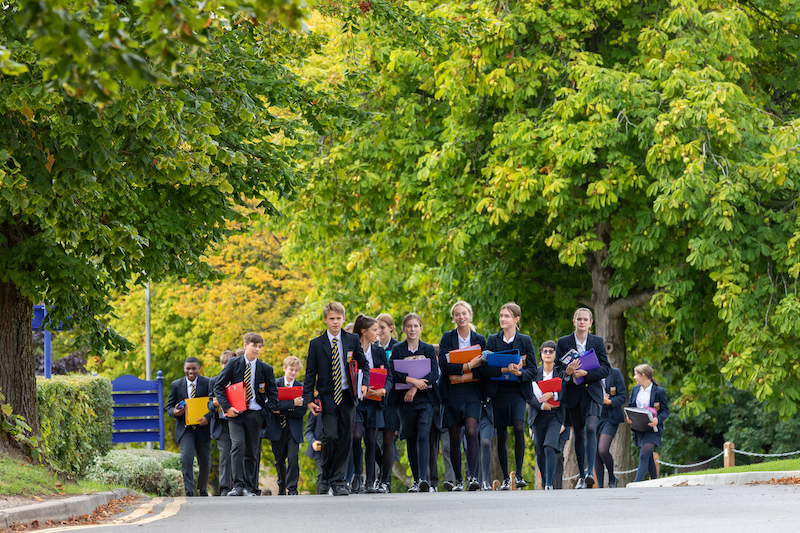Cranleigh Thinking
Posted on 25th Nov 2021 in School News, Which School?
By Dr John Taylor, Director of Learning, Teaching and Innovation, Cranleigh School
Questions about the purpose of education and in particular of the connection between learning and assessment have rarely been more prominent, nor more challenging, than since the onset of the pandemic. School closures, distance learning, the cancellation of public examinations and the ongoing uncertainty around learning loss have combined to bring into sharp focus the questions of how we teach and how we assess learning.
At Cranleigh, we are clear that learning, whilst it should never do less than prepare young people to excel in formal assessments, should also go beyond this. Our philosophy of learning – Cranleigh Thinking – is all about teaching beyond the test. It means that we aspire to focus not just on excellent outcomes as measured by examinations, but also the nurturing of the toolkit of skills and personal dispositions that will strengthen and deepen life for Cranleighans when those examinations are long gone.
Thinking is at the heart of our approach to deeper learning because, beyond all other qualities, it is the ability to think well that will best ensure young people are ready to face the challenges of an unpredictable future. We all face a world that is growing ever more complex, challenging and at the same time, intriguing and engaging in the possibilities that it offers. We can look upon climate change, the challenges of an unequal world, concern about mental health and the need to set our focus on a conception of well-being that goes beyond economic prosperity, as the catalysts for an exciting journey of creativity and innovation.
What changes will we have to embrace, if we are to shape a flourishing world? And what does it mean to equip young people with the confidence, skills and character traits to embrace the challenge of shaping a better world for the future?
The key to answering these questions lies in appreciating that education needs to encompass the realm of the philosophical. Both areas aim towards a deeper understanding of the world, of ourselves, and of our relations to one another.
Philosophical challenges are, by their nature, the very ones that transcend easy solutions. But it is their character as ‘open-ended’ that makes them so relevant as starting points for inquiry. They are not susceptible to easy answers in a short written examination, but they are powerful catalysts of thought. They engage the imagination and act as starting points for journeys of inquiry and creative investigation.
This rich philosophical understanding of learning translates into practical processes when we turn to look at its realization in the classroom and in the curriculum. Cranleigh Thinking begins when we ask open questions, and use these as the starting point for a thoughtful conversation, a conversation that might well lead into project work, a medium that affords scope for a richer response to these deep and nuanced questions than a written examination.
Students at Cranleigh encounter Cranleigh Thinking as open-ended questions arising across the curriculum. What makes a piece of music great? What is art? Is social media harming young people? Is lying always wrong? Catalytic questions like these lead into extended investigation and project work, work which might take the form of a written dissertation but could also lead to a creative outcome in the form of a podcast, video, or a piece of art or engineering which embodies within itself a response to the challenge of sustainable design for the future.
At Cranleigh, we value this mode of thinking and working so much that we place it at the heart of our answer to the question of what learning means. We want Cranleighan students to be thinkers – individuals with the knowledge, skills and confidence to look upon life’s great questions and see within them an opportunity for a creative, personal response.
This conception of learning informs the work going on at Cranleigh to promote and expand the role of project work within the curriculum, embracing the challenge of moving into the digital domain, supporting teachers as they acquire new skills as project mentors and creating openings for project work within the curriculum as well as in the form of enrichments, such as the new ISEB Project Qualification, piloted at Cranleigh Prep School, and the School Certificate in Philosophy, developed through a partnership between Cranleigh School and New College of the Humanities.
We also see Cranleigh Thinking as a vision for learning that has international scope. A new cross-schools learning, teaching and innovation committee has been formed to facilitate a conversation about pedagogical ideas and initiatives connecting Cranleigh UK with colleagues in Cranleigh China and Cranleigh Abu Dhabi.
The unifying element in all these ventures is an ongoing quest for an understanding of education that looks beyond the test – a more thoughtful, open, reflective mode of learning that offers young people the freedom and power that comes from learning to think for yourself about life’s vast questions and challenges.
This article first appeared in the 2022 edition of Which School? You can read the new edition here: